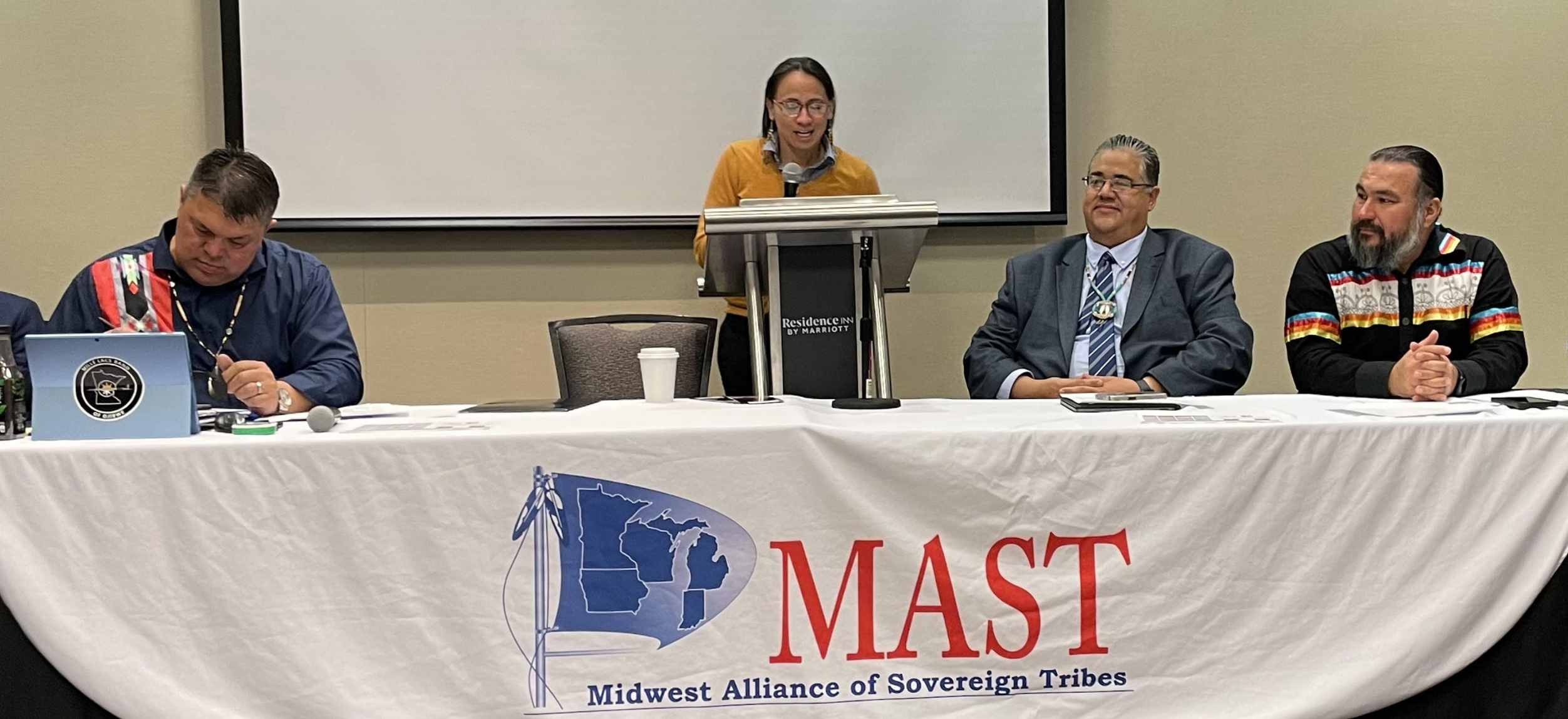
- Details
- By Levi Rickert
WASHINGTON — Members of the Midwest Alliance of Sovereign Tribes (MAST) gathered this week in Washington, D.C. for the organization's annual Impact Week. The event ran from Monday to Thursday at the Residence Inn Washington, DC National Mall.
In addition to meetings at the host hotel, MAST members visited Capitol Hill to discuss issues and concerns important to their respective tribes.
Established in 1996, MAST represents 35 sovereign tribal nations across Minnesota, Wisconsin, Iowa, and Michigan, collectively advocating for nearly 140,000 American Indian people.
This year’s Impact Week carried particular significance as tribes navigate policy shifts following the presidential administration change in January. Since President Donald Trump took office, executive orders and other directives have introduced new challenges for tribal nations.
MAST members have voiced concerns over potential losses of federal contracts and the effects of government funding cuts on tribal colleges and universities.
“We must unapologetically lead with our Indigenous truths,” MAST President Virgil Wind, chief executive of Mille Lacs Band of Ojibwe, said as he opened the week on Monday morning. “Let us remember that our greatest strength is not found in what divides us, but in what binds us, our shared history, our shared responsibility, and our shared hope for the future.”
Rep. Sharice Davids, a four-term member of the House of Representatives, who represents Kansas’ 3rd congressional district, addressed the MAST conference on Monday morning. Rep. Davids is a Democrat and a tribal citizen of the Ho-Chunk Nation headquartered in Wisconsin.
Davids discussed the challenges and accomplishments in advocating for Indian Country in Congress. She highlighted the $13 billion allocated in the bipartisan infrastructure law for Indian Country that was a product of the Biden administration, focusing on climate resilience, transportation, and broadband access.
She also emphasized the importance of advance appropriations for Indian Health Service (IHS) to ensure Indian Country obtains good healthcare.
Davids talked about the president’s executive order released last week Thursday that puts in motion the dismantling of the U.S. Department of Education.
“Dismantling something is not the path to improving it, so we have to push back because of our Bureau of Education (BIE) schools. Those efforts are vital to the education of our Native youth, Davids said.
“And, do we want to improve these programs? Absolutely, but doing away with those programs is just not going to get us there,” she continued.
National Congress of American Indians executive director Larry Wright, Jr. (Ponca Tribe) said the White House has been very quiet when it comes to addressing Indian Country issues.
“It’s become increasingly clear how fragile our progress can be when the executive branch’s decisions are made without tribal consultation and a lot of times without regard to the U.S. Constitution,” Wright said.
“What’s critical for you as tribal leaders in your respective states is to really lean in on your members of Congress, Democrats and Republicans, especially Republicans,” Wright continued.
More Stories Like This
Native News Weekly (August 25, 2024): D.C. BriefsUS Presidents in Their Own Words Concerning American Indians
Indigenous Actor Elaine Miles Reports Detention by Alleged ICE Agents
Happy Thanksgiving from Native News Online
Coming Up on Native Bidaské: Behind the Animation: Joey Clift Talks “Pow” and Native Storytelling
Help us tell the stories that could save Native languages and food traditions
At a critical moment for Indian Country, Native News Online is embarking on our most ambitious reporting project yet: "Cultivating Culture," a three-year investigation into two forces shaping Native community survival—food sovereignty and language revitalization.
The devastating impact of COVID-19 accelerated the loss of Native elders and with them, irreplaceable cultural knowledge. Yet across tribal communities, innovative leaders are fighting back, reclaiming traditional food systems and breathing new life into Native languages. These aren't just cultural preservation efforts—they're powerful pathways to community health, healing, and resilience.
Our dedicated reporting team will spend three years documenting these stories through on-the-ground reporting in 18 tribal communities, producing over 200 in-depth stories, 18 podcast episodes, and multimedia content that amplifies Indigenous voices. We'll show policymakers, funders, and allies how cultural restoration directly impacts physical and mental wellness while celebrating successful models of sovereignty and self-determination.
This isn't corporate media parachuting into Indian Country for a quick story. This is sustained, relationship-based journalism by Native reporters who understand these communities. It's "Warrior Journalism"—fearless reporting that serves the 5.5 million readers who depend on us for news that mainstream media often ignores.
We need your help right now. While we've secured partial funding, we're still $450,000 short of our three-year budget. Our immediate goal is $25,000 this month to keep this critical work moving forward—funding reporter salaries, travel to remote communities, photography, and the deep reporting these stories deserve.
Every dollar directly supports Indigenous journalists telling Indigenous stories. Whether it's $5 or $50, your contribution ensures these vital narratives of resilience, innovation, and hope don't disappear into silence.
 The stakes couldn't be higher. Native languages are being lost at an alarming rate. Food insecurity plagues many tribal communities. But solutions are emerging, and these stories need to be told.
The stakes couldn't be higher. Native languages are being lost at an alarming rate. Food insecurity plagues many tribal communities. But solutions are emerging, and these stories need to be told.
Support independent Native journalism. Fund the stories that matter.
Levi Rickert (Potawatomi), Editor & Publisher

